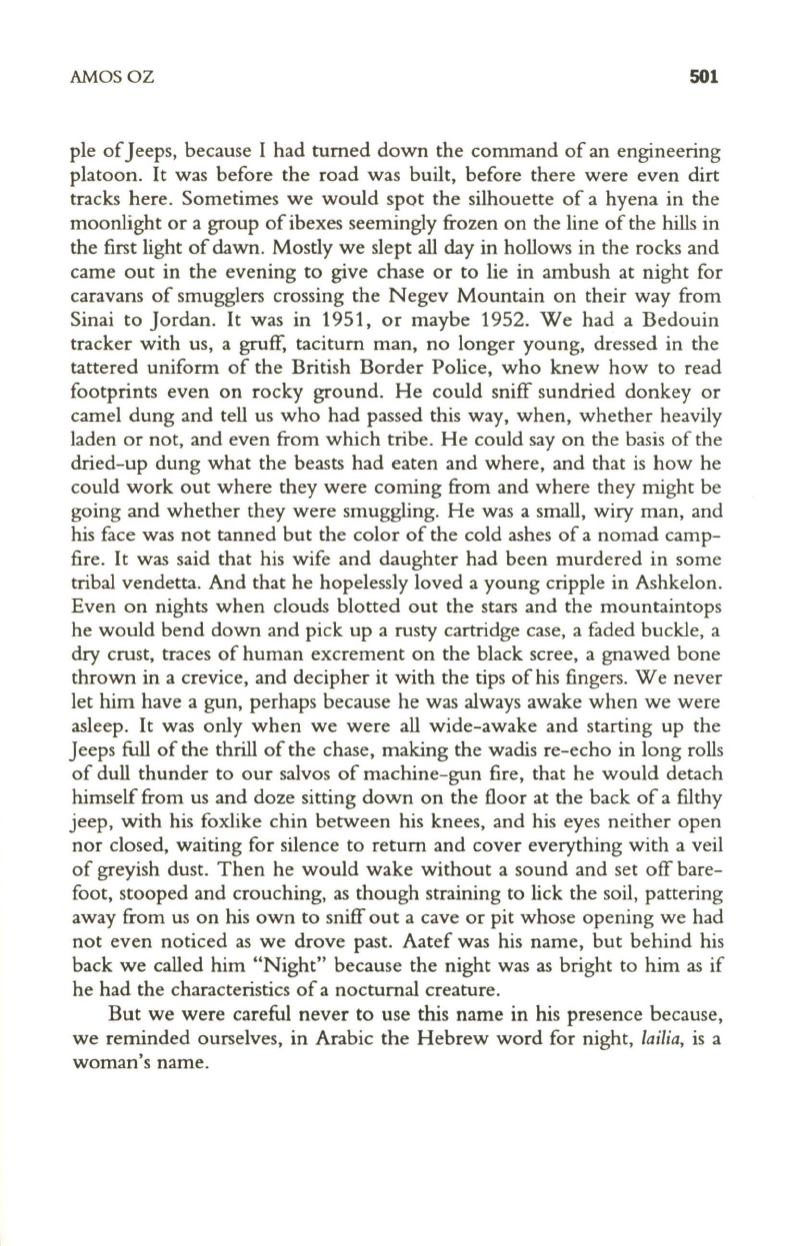
AMOSOZ
SOl
pIe ofJeeps, because I had turned down the command of an engineering
platoon. It was before the road was built, before there were even dirt
tracks here. Sometimes we would spot the silhouette of a hyena in the
moonlight or a group of ibexes seemingly frozen on the line of the hills in
the first light of dawn. Mostly we slept all day in hollows in the rocks and
came out in the evening to give chase or to lie in ambush at night for
caravans of smugglers crossing the Negev Mountain on their way from
Sinai to Jordan. It was in 1951, or maybe 1952. We had a Bedouin
tracker with us, a
gruff,
taciturn man, no longer young, dressed in the
tattered uniform of the British Border Police, who knew how to read
footprints even on rocky ground. He could sniff sundried donkey or
camel dung and tell us who had passed this way, when, whether heavily
laden or not, and even from which tribe. He could say on the basis of the
dried-up dung what the beasts had eaten and where, and that is how he
could work out where they were coming from and where they might be
going and whether they were smuggling. He was a small, wiry man, and
his face was not tanned but the color of the cold ashes of a nomad camp–
fire .
It
was said that his wife and daughter had been murdered in some
tribal vendetta. And that he hopelessly loved a young cripple in Ashkelon.
Even on nights when clouds blotted out the stars and the mountaintops
he would bend down and pick up a rusty cartridge case, a faded buckle, a
dry crust, traces of human excrement on the black scree, a gnawed bone
thrown in a crevice, and decipher it with the tips of his fingers. We never
let him have a gun, perhaps because he was always awake when we were
asleep. It was only when we were all wide-awake and starting up the
Jeeps
full
of the thrill of the chase, making the wadis re-echo in long rolls
of dull thunder to our salvos of machine-gun fire, that he would detach
himself from us and doze sitting down on the floor at the back of a filthy
jeep, with his foxlike chin between his knees, and his eyes neither open
nor closed, waiting for silence to return and cover everything with a veil
of greyish dust. Then he would wake without a sound and set off bare–
foot, stooped and crouching, as though straining to lick the soil, pattering
away from us on his own to sniff out a cave or pit whose opening we had
not even noticed as we drove past. Aatef was his name, but behind his
back we called him "Night" because the night was as bright to him as if
he had the characteristics of a nocturnal creature.
But we were careful never to use this name in his presence because,
we reminded ourselves, in Arabic the Hebrew word for night,
lailia,
is a
woman's name.


